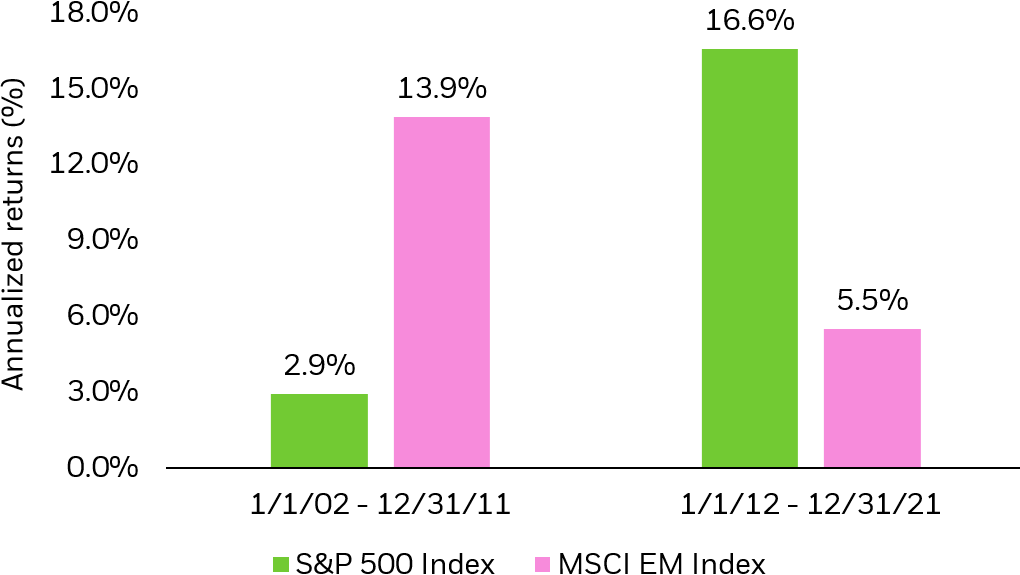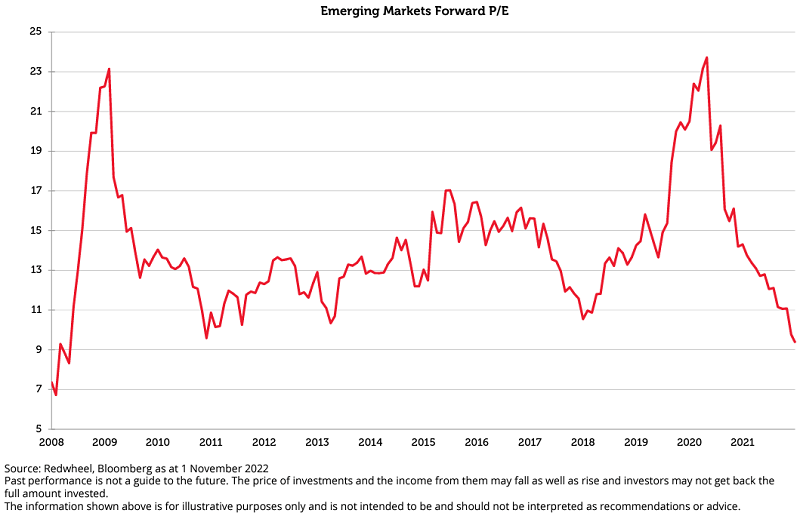Emerging market equities can offer substantially higher returns than developed equities due to many reasons. For instance, the economies of developing countries grow much higher and faster than developed countries.While firms in the developed world may struggle to grow their market share in the domestic market companies in the emerging world may continue to expand as the growth potential is huge. Products like consumer goods, healthcare items, household goods, food products, etc. have yet to reach many consumers in the developing world unlike in the developed world where people take these things for granted.
From an investment point of view, many investors own emerging market stocks for their price appreciation potential. This makes sense since they are basically trying t profit from the higher economic growth common in these markets. Not many investors go to emerging markets for safety, higher dividend yield, etc. Compared to the developed markets, emerging market equities are more risky in general and they are also more volatile. Many emerging markets are more volatile because of many factors including low retail and domestic investor participation, political risk, currency risk, state intervention in industries, etc. While political risk is rarely an issue in the developed countries, in emerging markets it is a huge risk.
So one of the questions that emerging market investors may have is this: Should I hold my emerging stocks for the long-term as measured by years and decades? This is a valid question since emerging economies tend to have uneven growth. Periods of strong economic expansions are followed by severe contractions and the cycle repeats. Due to this roller-coaster ride, investors may wonder if it is a good idea to sell emerging stocks at the peak and then buy back at the trough and then sell again at the next peak and perform these actions over and over again. To put it another way: Can market timing work in emerging markets?
Though developing economies experience for boom and busts, research suggests that investors are better off holding emerging stocks for the long-term as opposed to engaging in market timing, Despite the ups-and-downs of emerging markets, higher returns are possible when investors stay put even during market volatility. This makes sense since one invests in these markets to capture the profits from higher economic growth over the years and not in weeks or months. Hence pulling out of emerging stocks during market crashes is not a wise strategy.
From a Morgan Stanley research report on this topic:
“Trying to get the timing right in a volatile asset class like this is nearly impossible,” he says. Instead, investors comfortable with the higher risks of emerging markets versus developed markets, should consider strategies that seek to generate more consistent returns, while staying invested during the asset class’s ups and downs.
“Investors have to stop thinking about EM in terms of piling in when it’s rallying and rushing out again when things go bad,” Sinha argues.
His team’s analysis of MSCI EM index returns since 1988 suggests that a $10,000 investment made back then would now be valued at about $80,000. On the other hand, investors who hopped in and out of the market wouldn’t have seen anywhere near that return for the same time period.
Sinha is not suggesting that EM stocks need to be held for 28 years. Rather, the analysis of the index’s returns over time demonstrates that even missing out on upside a few months every year can defeat the purpose of buying EM stocks for return potential.
Source: Emerging Markets: It;s How, Not When, Morgan Stanley
To check the importance of holding emerging equities for the long-term, I tested the returns of three randomly-selected stocks. Below are the returns of these stocks over different time periods.
1.Banco de Chile (BCH)
YTD Return: 4%
5-Year Return: -21%
10-Year Return: 46%
Long-Term Return: 297%
2.ICICI Bank Ltd (IBN)
YTD Return: 14%
5-Year Return: 29%
10-Year Return: -4%
Long-Term Return: 193%
3. Itau Unibanco Holding SA (ITUB)
YTD Return: 20%
5-Year Return: -14%
10-Year Return: -86%
Long-Term Return: 14%
Until late last year, Chile was hurt deeply by the collapse in copper prices. So the five year return is negative for BCH. But over the 10-year and long-term the returns are positive and decent. Though the stock has seen its share of volatility over the years, it would be unwise to sell and buy back at a lower price. It should be noted that the bank pays solid dividends and those are not included in the above returns. So if the dividends received are included the returns would be much higher. This example proves that holding emerging stocks for the long-term is not a bad idea. Similarly the Indian equity market has experienced bull and bear markets over the past few decades. In the 5-year period IBN yielded a 29% return. But over the year 10-year period the return was a loss of 4%. However since April 2000 the stock has had a return of 193%.
In summary, investors can hold emerging stocks for the long-run provided they are high-quality stocks. Holding an internet dot-com stock from China or a small-cap gold miner in South Africa for the long-term is foolish. Instead just like developed markets, investors need to identify good companies in emerging markets and can hold them for years ignoring short-term volatility that seem to hallmark of these markets.
Note: Returns shown above are price returns only (excluding dividends)
Data Source: Google Finance
Disclosure: Long BCH and ITUB




